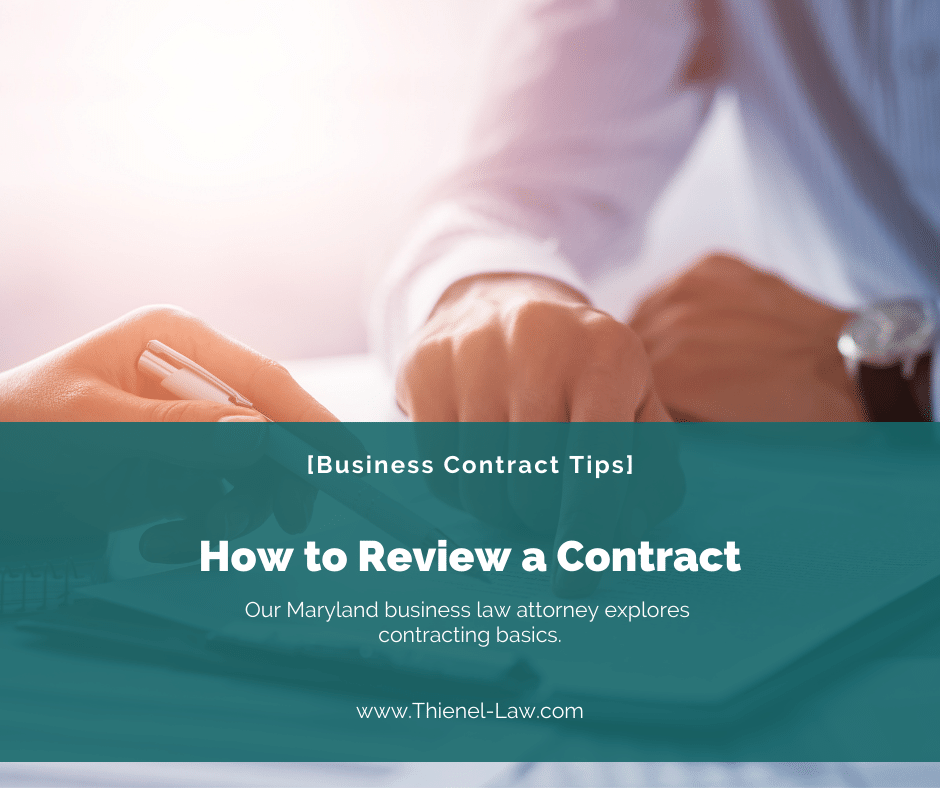
THIENEL LAW BLOG
Small Business Bookkeeping Tips from a Maryland Business Tax Attorney
Learn how to manage the financial side of your business so you can get back to providing the goods or services that are the backbone of your company. Here are the top 10 small business bookkeeping tips from a Columbia, Maryland business tax attorney.
Maryland Trust Attorney - How Does a Trust Work?
Trusts offer unique advantages and greater flexibility than wills, making them a popular estate planning tool. Your personal circumstances and legacy objectives will guide which type of trust you select to meet your needs.
Small Business Taxes to Watch Out for in 2021
Small business owners need to keep their eyes on several things that can affect their taxes in 2021. The Tax Cuts and Jobs Act of 2018 significantly changed the taxation of small businesses. There have been tax incentives and programs to help businesses survive financially during the COVID-19 pandemic. Also, small businesses are subject to several types of taxes even when there are no pandemics or new tax code provisions.
How Can I Avoid Paying Taxes When I Retire?
Paying taxes during retirement is a harsh reality that many people are not prepared for when they retire. The key to reducing tax liability during retirement is early planning. If you wait until you retire, it may be too late to take advantage of some retirement-planning strategies.
Solar Tax Credits | What’s Available in 2021
Individuals and businesses in Maryland have state and federal solar incentives available to encourage them to invest in solar PV (photovoltaics). A Maryland tax attorney can answer your questions about what’s available in 2021 for solar tax credits.
Business is Changing | The New Normal After Covid-19
Just as the September 11 attacks forever changed air travel, most people anticipate the pandemic will force us to adapt to a different way of doing business. Business is changing, and there will likely be a “new normal” after COVID-19.
Six Possible Post-Election Tax Law Changes
President-elect Joe Biden’s tax plan is more moderate than the proposed plans of some of the other Democratic primary candidates but less conservative than the Tax Cuts and Jobs Act of 2017 of President Trump.
What Can I Write Off as a Business Expense in 2021?
This year brought many challenges that most people have never had to face before. A Maryland business tax attorney can help you evaluate your situation and answer your questions about what you can write off as a business expense in 2021.
The New Normal of Business | 5 Traits That Will Determine Success in 2021
Things that entrepreneurs do today can determine whether they will still be open in 2021 and whether they will enjoy success when the economy improves. Here are 5 traits or strategies that will determine success in 2021.
Estate and Gift Tax—Are You Prepared for Changes?
The IRS recently announced new limits for estate and gift tax exemptions. For high-net-worth individuals, the estate and gift tax exemption increase is an essential element of estate planning. Shielding $11.7 million (or $23.4 for a married couple) can significantly reduce the estate tax burden for heirs.
How Does a Maryland LLC Pay Taxes?
A Limited Liability Company (LLC) is organized under state laws. Many companies choose a Maryland LLC as their business entity because it provides limited liability protection from personal liability. State laws govern the operation of an LLC in Maryland. However, the Internal Revenue Code provides alternatives for how an LLC is taxed for the income it earns.
The New Normal of Business | 3 Adaptations for Success
Businesses that have not yet accepted that the old ways will not return need to take immediate steps to contend with the new normal. If they are not willing to adapt, they may not survive.
7 Scams Against the Elderly in 2020
A Maryland elder law attorney can help if your loved one got ripped off by one of these scams against the elderly in 2020. You can call us today for a consultation.
The Older American’s Act - Still Relevant in 2020?
Yes, the Older Americans Act (OAA) provides the funding for critical services seniors need to stay independent and healthy. Congress re-authorized the OAA unanimously in 2020. A Maryland elder law attorney can answer your questions about the Act.
[Updated 2020] Do You Owe Back Taxes? Here's What You Can Do To Get The IRS to Go Easy on You.
It's tempting to procrastinate when you get a letter from the Internal Revenue Service (IRS) that you owe back taxes, but that is the worst thing to do. If you ignore collection efforts from the IRS, things will only get worse, and you will owe more in interest and penalties.
How to Review a Contract
A Maryland business contracts attorney can provide legal advice and explain how to review a contract for your Maryland or Washington, DC company. You can call for a consultation.
Six Tips for Weathering a Recession as a Business Owner
Some financial analysts have predicted that the U.S. economy may be headed toward a recession. The financial hardship caused by the COVID-19 outbreak has been difficult for many companies. With a potential recession on the horizon, it is time to take steps to recession-proof your company.
Common Elder Law Terms Defined
The legal terms used in elder law situations can be confusing and daunting. It is impossible to list and define all the elder law terms in this article, but here are some of the more common jargon you might encounter. A Maryland elder law attorney can answer your questions about these and other elder law terms.
The Tax Cuts & Jobs Act Revisited [2020 Tax Update]
The Tax Cuts and Jobs Act (TCJA) received a lot of attention when it passed in 2017, but with everything that has happened since, it would be a good idea to take another look at the TJCA. Some provisions of the tax reform act did not go into effect immediately, so you might want to talk to a Maryland tax attorney and revisit the TJCA.
The Only Wrong Answer is 50/50: Calculating The Co-Founder Equity Split
Many founders assign equal equity splits before any measurable investment of time, energy, or money into the start-up. Often, early and equal equity splits presume to avoid later tensions and future disagreements among founders while creating a clear path for moving onto other operational decisions. While there are various ways to calculate the co-founder equity split, the only wrong answer is a hasty 50/50 split.















![[Updated 2020] Do You Owe Back Taxes? Here's What You Can Do To Get The IRS to Go Easy on You.](https://images.squarespace-cdn.com/content/v1/639b5b2c4098ba4df6e6dc92/1673206167265-SNE8993AWIJW9DZ0T164/Dealing%2Bwith%2BBack%2BTaxes.png)



![The Tax Cuts & Jobs Act Revisited [2020 Tax Update]](https://images.squarespace-cdn.com/content/v1/639b5b2c4098ba4df6e6dc92/1673207425967-E2RRW3ZE4GQLMDDS8UQU/Tax%2BCuts%2B%26%2BJobs%2BAct%2B-%2BMaryland%2BTax%2BAttorney.png)
